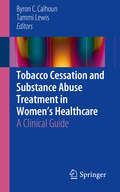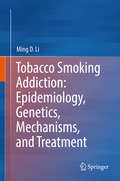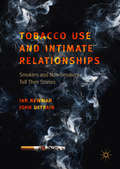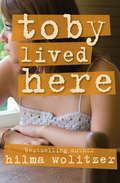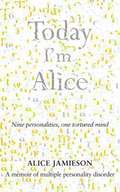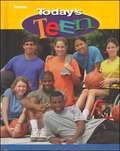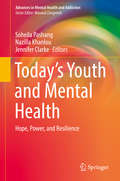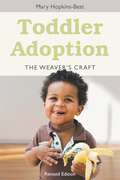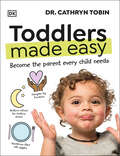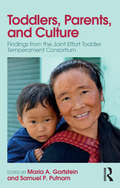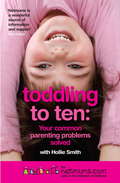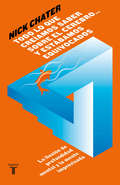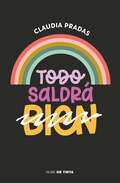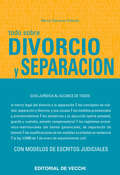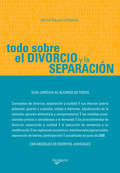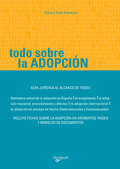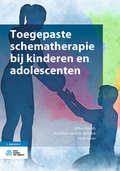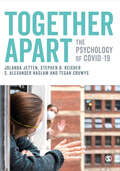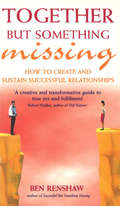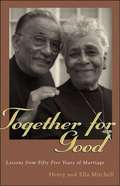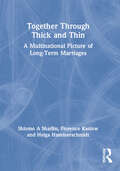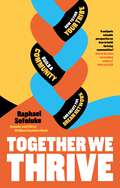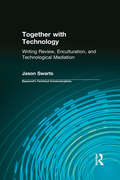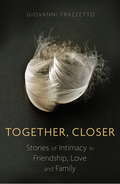- Table View
- List View
Tobacco Cessation and Substance Abuse Treatment in Women's Healthcare
by Byron C. Calhoun Tammi LewisThis book is a comprehensive guide to the screening, management, and treatment of female patients with addictions. There are a range of clinical issues specific to women with substance use disorders and substance abuse during pregnancy is known to have deleterious effects on neonates. This book focuses on the effective care of the addicted patient and discusses novel outpatient therapy, therapeutic substitution, abstinence therapy, and the importance of counseling in the delivery of care. Topics include the physiology of nicotine, opiates, EtOH, and other substances of abuse; the role of receptors and neurotransmitters in addiction; the effects of tobacco and substance abuse on women' s health; and tobacco cessation methods. Featuring practical approaches to gender-responsive treatment, Tobacco Cessation and Substance Abuse in Women's Healthcare is a valuable resource for obstetricians, gynecologists, family medicine practitioners, and residents hoping to expand their knowledge of tobacco cessation and substance abuse in women's health.
Tobacco Smoking Addiction: Epidemiology, Genetics, Mechanisms, and Treatment
by Ming D. LiThis book provides the most recent knowledge on almost all key aspects of the health impact of tobacco smoking. Its 21 chapters focus on both preclinical and clinical studies. The contents are broad, covering the epidemiology of tobacco smoking; genetic epidemiology; identification of susceptibility genomic regions, genes, and pathways as determined by both human and animal studies; evolutionary relations among the different nAChR subunit genes that are so important to the nicotine response; smoking-related diseases; E-cigarettes; and smoking cessation. Furthermore, each chapter includes a detailed and comprehensive list of key references. For both clinical and basic researchers, this book is a valuable resource on nicotine dependence and other addictions.
Tobacco Use and Intimate Relationships: Smokers And Non-smokers Tell Their Stories
by Ian Newman John DeFrainThis book presents a wide variety of insights into the effects of smoking on both smokers and non-smokers. Based on extensive questionnaire surveys from across the USA, this research explores the complex dynamics of intimate relationships and how they are affected by smoking, especially with regard to honest communication. The volume delves into the battles which take place behind closed doors as both smokers and non-smokers invoke personal rights and argue their positions. Finally, the authors explore how health policy and public policy can better serve both smokers and non-smokers, and what the future may hold for the regulation of tobacco use.
Toby Lived Here
by Hilma WolitzerWhile in foster care, Toby and her sister learn what "family" really meansWhen Toby's father dies in a car accident, her mother gets a new job and a cheaper apartment. At first it seems as if everything might be all right, but soon the pressure gets to be too much. Toby's mother stops cooking, stops talking, and starts crying or laughing at random times. When she is committed to a rest home, Toby and her sister, Anne, are placed in foster care against their will.. The Selwyns are a kind couple, but nothing about their house feels like home. The artwork is tacky, the music is lame, and the kitchen table is depressing yellow Formica. But in her simple little bedroom, Toby finds a haven. As she and her sister struggle to adjust to their scary new life, she learns that family is what you make it, and home can be anywhere you feel at peace. This ebook features an illustrated biography of Hilma Wolitzer, including rare photos and never-before-seen documents from the author's personal collection.
Today I'm Alice: Nine Personalities, One Tortured Mind
by Alice JamiesonWhen Alice was a teenager, strange things started happening to her. Hours of her life simply disappeared. She'd hear voices shouting at her, telling her she was useless. And the nightmares that had haunted her since early childhood, scenes of men abusing her, became more detailed . . . more real. Staring at herself in the mirror she'd catch her face changing, as if someone else was looking out through her eyes. In Today I'm Alice, she describes her extraordinary journey from a teenage girl battling anorexia and OCD, drowning the voices with alcohol, to a young woman slipping further and further into mental illness. It was only after years lost in institutions that she was correctly diagnosed with multiple personality disorder. When her alternative personalities were revealed in therapy she discovered how each one had their own memories of abuse and a full picture of her childhood finally emerged. As she learned to live with her many 'alters', she set out to confront the man who had caused her unbearable pain. Moving and ultimately inspiring, this is a gripping account of a rare condition, and the remarkable story of a courageous woman.
Today's Teen (7th edition)
by Eddye Eubanks Joan Kelly-Plate Glencoe McGraw-Hill StaffEquip your students, grades 7-9, with the basic life skills they'll need! This updated, 7th edition provides a hands-on approach to personal development, relationship skills, managing resources, food and nutrition, clothing, housing, and more. Special feature strands throughout the text maximize student learning. Try It Out features encourage students to use their problem-solving skills. Safety First provides students with safety tips that relate to chapter content. Making a Difference features suggest ways that students can make a difference within their families, schools, or communities. How-To features offer students practical, usable information designed to enhance the development of life skills. Take Note extends text information and highlights key topics. Career Network pages offer students insight into the world of work within the various career clusters. Linking School to Career activities help students explore careers of interest.
Today’s Youth and Mental Health: Hope, Power, And Resilience (Advances in Mental Health and Addiction)
by Nazilla Khanlou Soheila Pashang Jennifer ClarkeThis book focuses on the social and intersectional determinants of mental health among youth. The innovative and cutting edge text arises out of multidisciplinary fields of academic, researchers, policy makers, practitioners, artists, and youth. Contributions from Canada, Germany, Portugal, South Korea, Burkina Faso, Afghanistan, and Jamaica addresses the complexities and the opportunities for youth across contexts. Each chapter entails an introduction to the topic, literature review and research findings, discussion, and implications in regard to research, policy, and practice. A unique aspect of the book is the inclusion of a critical response to each chapter’s content from diverse stakeholders (such as policy makers, front line workers, practitioners, community activists, artists and youth).The book is a critical and current contribution to exploring youth mental health and, specifically, the ways in which youth learn, live, and resist in a world around them. Topics examined include youth social engagement, civic integration, and political participation at multiple local, regional, and transnational levels.
Toddler Adoption: The Weaver's Craft Revised Edition
by Mary Hopkins-BestToddler Adoption looks at the unique joys and challenges of adopting and parenting a toddler. When a child aged is adopted between the ages of 12 to 36 months, they often show signs of cognitive and emotional immaturity, which can cause behavioral and relational issues. This book offers support and practical tools to help parents prepare for and support the toddler's transition between the familiar environment of their biological parent's home or foster home to a new and unfamiliar one, and considers the issues that arise at different developmental stages. It highlights the challenges that parents are likely to encounter, but also gives positive guidance on how to overcome them. Written by a specialist in children's development who is also an adoptive parent herself, this fully revised and updated edition of the go-to-source on adopting toddlers is essential reading for both parents and professionals working with adoptive families.
Toddlers Made Easy: Become the Parent Every Child Needs
by Cathryn TobinHow to transform everyday life with a toddler.Packed with friendly and helpful advice to support parents and toddlers during their trickiest moments, Dr. Tobin helps parents see matters from your toddler's point of view, with lively illustrations showing their thought patterns. Parent quizzes throughout the book help parents think about how to best handle a scenario, reflect on their own parenting background, and communicate effectively and calmly to support their child through this key developmental stage.
Toddlers, Parents and Culture: Findings from the Joint Effort Toddler Temperament Consortium
by Maria A. Gartstein Samuel P. PutnamOne doesn’t have to travel extensively to realize that there are intriguing differences in the ways in which people from different cultures tend to behave. Gartstein and Putnam explore whether these differences are shaped during the early years of life, at the moment when children are just beginning to understand how, when, and why they should express some emotions, and not others. Based on the findings of the Joint Effort Toddler Temperament Consortium (JETTC), which asked parents from 14 different countries multiple questions regarding their main goals and techniques for raising children to be successful in their culture, Gartstein and Putnam analyze how children’s characteristics (both normative and problematic) are shaped by different cultural environments. Drawing from insights in anthropology, sociology, and developmental psychology, the book explores the full spectrum of human experience, from broad sets of values and concerns that differentiate populations down to the intimate details of parent-child relationships. The results reveal a complex web of interrelations among societal ideals, parental attempts to fulfill them, and the ways their children manifest these efforts. In doing so, they provide a revealing look at how families raise their young children around the world. Toddlers, Parents, and Culture will be of great interest to students and scholars in temperament, cross-cultural psychology, parenting and socioemotional development in early childhood, as well as professionals in early education, child mental health, and behavioral pediatrics.
Toddling to Ten: Your Common Parenting Problems Solved: The Netmums Guide to the Challenges of Childhood
by Netmums Hollie Smith Siobhan FreegardHow do you avoid pyjama dramas and get a toddler to play ball at bedtime? How do you manage your child's time on the computer and kids who are couch potatoes? What do you do when your five year old starts telling lies? All the answers can be found in this comprehensive guide to coping with the challenges of childhood. A hand-selected panel of experts ranging from dentists to psychologists provide scholarly advice. But, crucially, there are hundreds of top tips and suggestions from other mums - the members of netmums.com, the rapidly-growing online community of mothers sharing valuable information on all aspects of childcare. It's real advice for real women, and is guaranteed to put the fun back into family life.
Todo lo que creíamos saber sobre el cerebro... y estábamos equivocados: La ilusión de profundidad mental y la mente improvisada
by Nick ChaterCon una interpretación radical sobre cómo funciona el cerebro, y ganador del Prose Awards 2019 en la categoría de psicología clínica, Nick Chater revela que la profundidad mental es sólo una ilusión. Asumimos que nuestras creencias y deseos surgen de las profundidades insondables de nuestra mente, y que si tuviéramos la llave para acceder a ese misterioso mundo, podríamos comprendernos en nuestra totalidad. Nick Chater llega a destruir este mito. Navegando en una nueva investigación en neurociencia, psicología del comportamiento y percepción, el especialista en comportamiento humano muestra que no existen esas profundidades para ser develadas ni tampoco el pensamiento inconsciente; sino que somos nosotros quienes generamos al instante nuestras propias ideas, motivaciones y pensamientos. Todo lo que creíamos saber sobre el cerebro... y estábamos equivocados nos lleva a descubrir, a través de ejemplos visuales y experimentos contraintuitivos, que somos los personajes de nuestra propia creación, improvisando constantemente nuestro comportamiento de acuerdo con nuestras experiencias en el pasado; y como Chater nos demuestra, reconociendo que esto puede ser liberador. «Un descubrimiento deslumbrante. Nick Chater me voló la cabeza.» Tim Harford, autor bestseller de El economista camuflado
Todo saldrá (bien)
by Claudia PradasClaudia P., le psicólogue de TikTok, aborda algunos de los problemas más frecuentes que afectan a los jóvenes y aporta recursos para solucionarlos Alexia siente unas emociones superintensas y muy difíciles de controlar que no la dejan tranquila. Marcos tiene depresión y no sabe dar con la solución a su problema. Samuel tiene días en los que no puede salir de la cama y días en los que se come el mundo; aunque, por suerte, él sí cuenta con un medicamento que lo ayuda a controlarse. Y Luna se mira al espejo y no se gusta, y cree que todo el mundo la observa. Como ellos, miles de jóvenes tienen dudas o miedos y sufren trastornos, y no saben dónde acudir para mejorar. A través de la vida de este grupo de adolescentes, Claudia P., le psicólogue de TikTok, aborda algunos de los problemas más frecuentes que afectan a los jóvenes y aporta recursos para solucionarlos.
Todo sobre divorcio y separación
by Mercè Tabuenca Petanàs* Los conceptos de nulidad matrimonial, separación y divorcio. * Los requisitos precisos para tramitarlas (injurias, abandono, cese de la convivencia, mutuo acuerdo, etc.) * Las consecuencias que implican (adjudicación de la patria potestad, guardia y custodia; pensiones compensatorias, etc.) * Los procedimientos judiciales más indicados para cada caso (separación o divorcio por mutuo acuerdo, medidas provisionales y provisionalísimas, etc.) * La ejecución de las sentencias y las medidas adoptadas ante su incumplimiento. * Los modelos de documentos para emprender las demandas, solicitar los convenios y presentar las alegaciones que se considerasen necesarias. El derecho de familia regula las relaciones entre los cónyuges y sus hijos, y proporciona pautas para la resolución de los conflictos de intereses. No obstante, es imposible atender todas las circunstancias y situaciones que influyen en cada uno de los casos. Por ello, en este libro, además de presentar las disposiciones jurídicas acerca del divorcio, la separación y la nulidad matrimonial, se dan las indicaciones para afrontar los problemas que surgieren en el transcurso de un proceso.
Todo sobre el divorcio y la separación
by Mercè Tabuenca PetanàsEl derecho de familia regula las relaciones entre los cónyuges y sus hijos, y proporciona pautas para la resolución de los conflictos de intereses. Pero es imposible atender todas las circunstancias y situaciones que influyen en cada uno de los casos. POr ello, en este libro, además de presentar las disposiciones jurídicas acerca del divorcio, la separación y la nulidad matrimonial, se dan las indicaciones para afrontar los problemas que pueden surguir en el transcurso del proceso.
Todo sobre la adopción
by Eduard Solé AlamarjaEsta guía expone de forma clara y sencilla los procesos jurídicos, técnicos y de tramitación de solicitudes para llevara a cabo la adopción de menores, tanto en España como en otros países.
Toegepaste schematherapie bij kinderen en adolescenten
by Jeffrey Roelofs Marjolein van Wijk-Herbrink Mieke BootsDit boek helpt zorgprofessionals bij het toepassen van schematherapie in de behandeling van kinderen, adolescenten, en hun ouders of (gezins)systeem. Het is bedoeld voor (klinisch) psychologen, psychotherapeuten en andere hulpverleners, en voor wie daarvoor een opleiding volgt. Toegepaste schematherapie bij kinderen en adolescenten biedt een breed overzicht van de toepassingsgebieden van schematherapie voor jeugdigen en hun gezins(systeem). Het laat eerst zien hoe de therapie inzicht geeft in de verschillende kanten (modi) en niet-adaptieve patronen die gedurende iemands leven zijn ontstaan. Vervolgens beschrijft het hoe schematherapie er in de praktijk uitziet voor verschillende doelgroepen, zoals jongeren met LVB of in de gesloten jeugdzorg. Telkens komen de technieken aan bod waarmee jongeren en hun omgeving geholpen kunnen worden om patronen te doorbreken en rekening te houden met de eigen behoeften en die van de omgeving.
Together Apart: The Psychology of COVID-19
by Jolanda Jetten S. Alexander Haslam Stephen D. Reicher Tegan CruwysWritten by leading social psychologists with expertise in leadership, health and emergency behaviour – who have also played an important role in advising governments on COVID-19 – this book provides a broad but integrated analysis of the psychology of COVID-19It explores the response to COVID-19 through the lens of social identity theory, drawing from insights provided by four decades of research. Starting from the premise that an effective response to the pandemic depends upon people coming together and supporting each other as members of a common community, the book helps us to understand emerging processes related to social (dis)connectedness, collective behaviour and the societal effects of COVID-19. In this it shows how psychological theory can help us better understand, and respond to, the events shaping the world in 2020. Considering key topics such as:LeadershipCommunicationRisk perceptionSocial isolationMental healthInequalityMisinformationPrejudice and racismBehaviour changeSocial DisorderThis book offers the foundation on which future analysis, intervention and policy can be built.We are proud to support the research into Covid-19 and are delighted to offer the finalised eBook for free.All Royalties from this book will be donated to charity.
Together Apart: The Psychology of COVID-19
by Jolanda Jetten S. Alexander Haslam Stephen D. Reicher Tegan CruwysWritten by leading social psychologists with expertise in leadership, health and emergency behaviour – who have also played an important role in advising governments on COVID-19 – this book provides a broad but integrated analysis of the psychology of COVID-19It explores the response to COVID-19 through the lens of social identity theory, drawing from insights provided by four decades of research. Starting from the premise that an effective response to the pandemic depends upon people coming together and supporting each other as members of a common community, the book helps us to understand emerging processes related to social (dis)connectedness, collective behaviour and the societal effects of COVID-19. In this it shows how psychological theory can help us better understand, and respond to, the events shaping the world in 2020. Considering key topics such as:LeadershipCommunicationRisk perceptionSocial isolationMental healthInequalityMisinformationPrejudice and racismBehaviour changeSocial DisorderThis book offers the foundation on which future analysis, intervention and policy can be built.We are proud to support the research into Covid-19 and are delighted to offer the finalised eBook for free.All Royalties from this book will be donated to charity.
Together But Something Missing: How to create and sustain successful relationships
by Ben RenshawPower struggles - Lack of communication - Unconscious needs - Fear of rejection - Different interests - Out of date habits - Fear of intimacy - High expectations - Too busy.If even one of these issues causes problems in your relationships, then this book is for you. As Britain's top personal development guru - and married himself - Ben Renshaw is able to throw strong light on what we can all do to improve our relationships, no matter what the problem. In his view there are ten principles of a successful partnership or marriage: Letting go of the past. Knowing what you want to say 'Yes' to. Realising that Now is New. Deciding how you want to be. Fearing less, talking more. Sexual healing. The inevitability of change. Living a life of gratitude. Making love more important than the relationship. Remembering the spirit zone. Full of thoughtful, realistic advice, this is the book no caring, sharing person can afford not to read.
Together For Good: Lessons from Fifty Five Years of Marriage
by Henry H. Mitchell Ella P. MitchellThe book tells how the Mitchells coped with the first year of marriage, financial problems, the birth and adoption of their children, switching jobs, and moving.
Together Through Thick and Thin: A Multinational Picture of Long-Term Marriages
by Florence Kaslow Shlomo A SharlinDiscover what factors, beliefs, and attitudes build a successful marriage!In the enormous social, political, and technological upheavals since World War I, the long and happy marriage has begun to seem like an endangered species. In the desperate hunt for reasons that marriages fail, most researchers have ignored the factors that help marriages succeed. Together Through Thick and Thin: A Multinational Picture of Long-Term Marriage reports a landmark study of long-term satisfaction in marriage. Instead of relying on conjecture or unproven clinical hunches, the authors studied the happily married around the world. The respondents’early experiences included the Great Depression, World War II, and the Holocaust as well as the Roaring Twenties. In the years since they married, technological change and the women's movement have made the world almost unrecognizable. Yet these people have managed to maintain both stability and quality in their marriages. The scope of Together Through Thick and Thin is sweeping: eight countries, more than 400 couples who had been happily married for between 25 and 45 years. Factors analyzed include degree of satisfaction, gender differences, socioeconomic level, family history, shared values, religious belief and practice, attitudes toward children, physical health, and problem-solving styles, among many others. Moreover, the book builds on existing documented literature on marriage. This solid background helps put its wealth of practical data into context, an ideal synthesis of theory and practice.This study delves into the reasons couples stay together and stay satisfied. What qualities and attitudes do happily married couples share? Can the factors that keep a Chilean couple together for life also apply in the very different cultures of Sweden, Israel, South Africa, the United States? What keeps a marriage together in times of crisis? How important is love?Together Through Thick and Thin helps you understand the diverse factors that affect marital quality and stability by offering a broad range of information:a comprehensive review of the literature of happy marriage cross-cultural comparisons that kindle fresh insights discussions of factors ranging from gender and economic status to family history and shared attitudes specific behaviors and attitudes that illuminate what matters most in marriage, from mutual respect to shared fun the reasons couples stick together during crises which problem-solving behaviors actually workTogether Through Thick and Thin provides psychologists, family therapists, and couples counselors with the solid data they need to guide couples in crisis toward greater intimacy, commitment, and joy together.
Together We Thrive: How to find your tribe, build a community and create the dream network
by Raphael Sofoluke‘Raphael has an experience few can equal. His book offers a uniquely valuable perspective on how to build thriving communities!’ Steven Bartlett, bestselling author of Diary of a CEOWe live in a world of individualism, where people act in their own interests, striving for their own success. Our focus on self-development means we’ve overlooked a vital and transformative power.In Together We Thrive, Raphael Sofoluke, Founder and CEO behind UK Black Business Show and UK Black Business Week, reveals the immense potential of harnessing a community.You’ll learn how to nurture the connections that will become your currency and build relationships that will fuel your success. Your network speaks louder than you can, amplifies your story, mission and values, and is more resilient than you could ever be on your own. Packed with insights and inspiration from Sofoluke and his own community of highly successful people, Together We Thrive will help you find a tribe of invaluable supporters who will hold you to account and make sure that you reach your full potential.If you want to go far, you have to go together.
Together with Technology: Writing Review, Enculturation, and Technological Mediation (Baywood's Technical Communications)
by Jason SwartsThis book examines the complex roles that texts serve as parts of an organizational cognitive infrastructure. Texts make knowledge and experience tangible and durable. They help shape interactions between people. As professions have become more writing-centered in recent decades, many organizations have instituted writing review practices to help newcomers produce better writing and thus become more effective organizational citizens.Dr. Swarts examines those writing review practices and questions whether available supportive technologies adequately prepare professional writers and professionals who write to appreciate the complex functions their texts serve. He reports on a study of the impact of two technologies (paper text and textual replay) on writing review. Unlike paper, which presents texts in a static form, textual replay presents texts as the products of writing practices. Textual replay records onscreen writing activity and creates a video that writers and reviewers use to supplement their discussion of revisions.
Together, Closer: Stories of Intimacy in Friendship, Love, and Family
by Giovanni FrazzettoA deeply felt book that explores intimacy through the stories of eight relationships, from a leading neuroscientist and author of How We Feel.What is intimacy and why do we need it?Intimacy is that moment when our true identity is revealed to another, when traumas, fears, and ambitions are shared. Whether in friendship, love or family, intimacy redresses itself constantly, demanding we raze emotional barriers and discover who we really are. Through the ordinary stories of eight relationships, neuroscientist Giovanni Frazzetto has woven an extraordinary narrative of togetherness. He shares the details of romantic partners trapped in a long cycle of attraction and rejection, a single woman who finds herself deep in a fictional relationship with a boyfriend she has invented out of frustration with her love life, and a couple absorbed in a years-long clandestine affair. But intimacy can also extend beyond romantic encounters: coping with the loss of a loved one, dealing with overbearing or emotionally distant parents, or celebrating the joys and comforts of our dearest friends. In Together, Closer, Frazzetto unravels the components of intimacy in all of these relationships, illuminating the mysteries, challenges, and pleasures of intimacy through a brilliant mix of storytelling and science.
